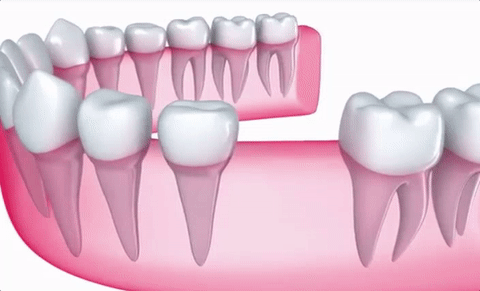Dental Implants
What are Dental Implants ?
Dental implants are easy and the most popular ideal solution, for replacing your missing tooth/teeth. They have definitely changed the course of dentistry in the last quarter of a century or so.
A dental implant is basically a titanium post which is surgically inserted into the jawbone beneath the gum line to work as a tooth root. Post insertion, an implantologist will attach a crown on top of the implant to ensure the appearance of a natural tooth.
Tooth Implants not only look and feel like your natural teeth but also function like the real one.

Looking for Dental Implants?
When you have one or more missing teeth, you’re more likely to suffer from poor self-esteem. Even worse, your oral health can be compromised. Fortunately, thanks to dental implants, there’s a solution for missing teeth. An increasing number of people are discovering the benefits of dental implants.
Why Dental Implants?
Implants are the best solution for simulating the look, feel, and function of natural teeth. Dental implants do much more than replace missing teeth. They help maintain and strengthen bone structure, provide the ability to chew healthy food, and give patients the confidence to smile. They also protect existing teeth by helping to preserve bone structure.
Once a tooth is lost, several things begin to happen that are not immediately noticeable to a patient and which can have a significant negative effect on both health and appearance. Tooth roots help hold teeth in place, but they are also critical in maintaining health in the surrounding gums and supporting bone structures. Bone loss in the jawbone is one significant problem that naturally occurs once a tooth is lost. This bone loss can compromise the integrity of neighboring tooth roots and tooth stability, and it is also a large part of what causes the “sunken” look that is seen in people who have lost several or all of their teeth. It is the reason patients who wear dentures find that over time their dentures are harder and harder to fit and keep in place.

SINGLE TOOTH REPLACEMENT X-RAY VIEW
SINGLE TOOTH REPLACEMENT CLINICAL VIEW
FULL MOUTH IMPLANTS
MULTIPLE TEETH REPLACEMENT STEP-1
MULTIPLE TEETH REPLACEMENT STEP-2
Difference Between Dental Implants & Bridges
| Bridges | Implants |
| May compromise the adjacent natural tooth | Does not compromise with an adjacent tooth |
| A bridge may need replacement at times where bone loss continues at the site of the missing tooth | An implant causes no bone loss as it gets attached with the bone and promotes healthy bone |
| With bridges, your teeth may be prone to plaque, decay or gum disease, with a risk of possible future root canal | With no free spaces in between, implants won’t attract bacteria ever for plaque accumulation |
FREQUENTLY ASKED QUESTIONS
Q.1. How Long Do Dental Implants Lasts?
Dental implants are known to last for very long, especially with proper care. They can last for as long as 25 years. Get dental implants from a professional at your nearest Clove Dental Clinic.
Q.2. Can One Get Full Mouth Dental Implants?
For missing teeth, dental implants have become the most promising choice. If your mouth is missing most or all of the teeth, then procedures like all-on-four and all-on-six can help get full mouth dental implants with 4 or 6 titanium posts on your jaw bone.
Q.3. Are Dental Implants Painful?
While getting dental implants from an expert implantologist, the patient will feel little or no pain at all. Part of the preparation for the implant includes administering a local anaesthetic so the patient does not feel any pain.



